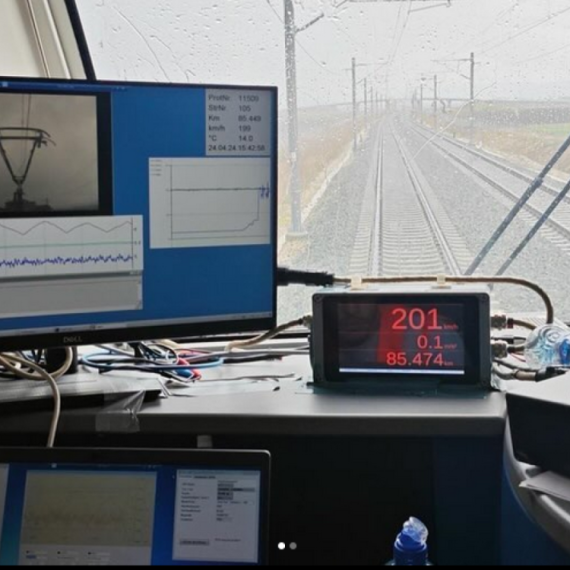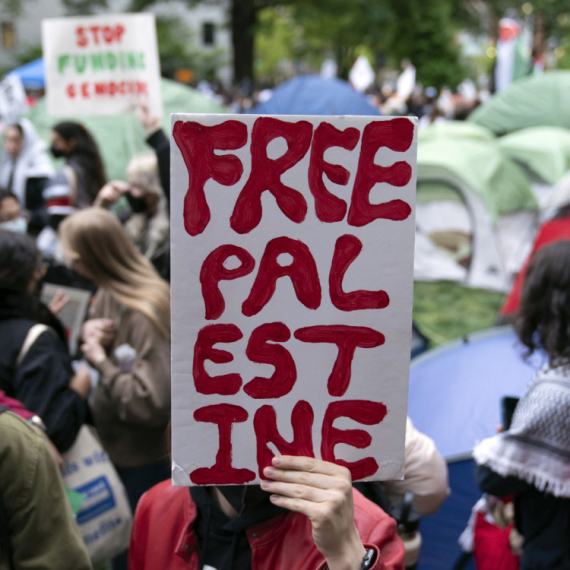PM: IMF informally agreed on deficit
Prime Minister Mirko Cvetković says the International Monetary Fund (IMF) "informally agreed" that the budget deficit in 2010 be around four percent.
Tuesday, 27.10.2009.
19:20

Prime Minister Mirko Cvetkovic says the International Monetary Fund (IMF) "informally agreed" that the budget deficit in 2010 be around four percent. “We discussed the percentage and they informally agreed with us. They did not oppose our proposal, and for me that means 'yes','" the prime minister told journalists in Uzice, western Serbia, where he was visiting this Tuesday. PM: IMF informally agreed on deficit He added that the meeting today with an IMF delegation agreed that the draft 2010 budget be made without VAT hikes, and that the solution should be sought in the reduction of spending. The Serbian premier underlined that it had been agreed with the IMF that a budget should be drafted which would in the mid-term "go in the direction of budget deficit elimination". Cvetkovic underscored that the reform of the pension system was also being discussed with the IMF representatives, but added, however, that it was "still not certain in which direction that segment of reforms would go". In Belgrade, Labor Minister Rasim Ljajic met with the international financial institution's mission, and said afterwards that there will be no changes in the total social benefits funding in 2010, but that there is a possibility of an increase in the number of users. This increase is possible taking into consideration the effects of the global economic crisis, Ljajic said, after the meeting which discussed measures that his ministry would take in 2010 in order to save money. According to a statement from the Labor Ministry, Ljajic informed the mission about the new steps that would take effect once a new law on social protection has been passed, which a working group of the ministry is currently drafting. He said that there will be a "more just distribution of social aid" with the new legislation. Ljajic said that there will be less abuse of funds once the new law is passed, adding that it will enable a more stable system in the long-term. The IMF delegation met with Deputy PM Jovan Krkobabic as well, who is in charge of social policy and issues in the Cvetkovic cabinet. According to earlier announcements, they were to discuss the pension system. The official negotiations between Serbia and the IMF concerning the second and third revision of the loan stand-by arrangement worth EUR 2.9bn began on Monday and will continue for the duration of the mission’s stay, which ends on November 4. The IMF board of directors approved the stand-by on May 15, 2009, which will last through April 2011. The funds from this agreement are about seven times what the IMF approved for Serbia in January 2009. Serbia has thus far withdrawn the first installment of about EUR 788mn.
PM: IMF informally agreed on deficit
He added that the meeting today with an IMF delegation agreed that the draft 2010 budget be made without VAT hikes, and that the solution should be sought in the reduction of spending.The Serbian premier underlined that it had been agreed with the IMF that a budget should be drafted which would in the mid-term "go in the direction of budget deficit elimination".
Cvetković underscored that the reform of the pension system was also being discussed with the IMF representatives, but added, however, that it was "still not certain in which direction that segment of reforms would go".
In Belgrade, Labor Minister Rasim Ljajić met with the international financial institution's mission, and said afterwards that there will be no changes in the total social benefits funding in 2010, but that there is a possibility of an increase in the number of users.
This increase is possible taking into consideration the effects of the global economic crisis, Ljajić said, after the meeting which discussed measures that his ministry would take in 2010 in order to save money.
According to a statement from the Labor Ministry, Ljajić informed the mission about the new steps that would take effect once a new law on social protection has been passed, which a working group of the ministry is currently drafting.
He said that there will be a "more just distribution of social aid" with the new legislation.
Ljajić said that there will be less abuse of funds once the new law is passed, adding that it will enable a more stable system in the long-term.
The IMF delegation met with Deputy PM Jovan Krkobabić as well, who is in charge of social policy and issues in the Cvetković cabinet. According to earlier announcements, they were to discuss the pension system.
The official negotiations between Serbia and the IMF concerning the second and third revision of the loan stand-by arrangement worth EUR 2.9bn began on Monday and will continue for the duration of the mission’s stay, which ends on November 4.
The IMF board of directors approved the stand-by on May 15, 2009, which will last through April 2011.
The funds from this agreement are about seven times what the IMF approved for Serbia in January 2009. Serbia has thus far withdrawn the first installment of about EUR 788mn.


























































Komentari 0